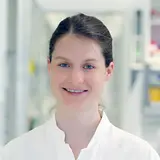Metabolic crosstalk in cancer
- Functional and Structural Genomics

Prof. Dr. Christiane Opitz
Evidence emerging in the last years has led to the re-appreciation of the central role of altered cell metabolism in cancer. We have identified a metabolic pathway of the essential amino acid tryptophan as a key element promoting malignant brain tumors.

Our Research
Tryptophan metabolites activate the dioxin receptor resulting in enhanced invasiveness and clonogenicity of brain tumor cells and increased formation of brain tumors. While the role of the dioxin receptor in cancer biology is well established, the signaling pathways through which the dioxin receptor promotes cancer are poorly understood. Due to the fact that tryptophan metabolites as (patho-)physiologically relevant endogenous dioxin receptor ligands were just identified, the signaling pathways activated by these endogenous dioxin receptor ligands remain elusive. As different dioxin receptor ligands exert diverse biological effects, it is expected that tryptophan metabolites will activate other signaling pathways than the classical and well-studied exogenous ligand dioxin. Inhibition of the dioxin receptor may be a new approach for cancer therapy. Understanding the downstream signaling pathways that are responsible for the tumor-promoting effects of endogenous dioxin receptor activation may identify more specific therapeutic targets for the treatment of tumors that rely on this pathway and and reveal potential biomarkers for monitoring biological activity of these pathways.
In the future we plan to identify the signaling pathways activated by tryptophan degradation in brain tumor cells. Specifically we will analyze the signaling pathways downstream of endogenous dioxin receptor signaling and the signaling pathways activated by tryptophan depletion. In addition we aim to use our expertise in monitoring cancer metabolism for the analysis of nicotinamide metabolism in brain tumors. Preliminary evidence suggests that several enzymes implicated in nicotinamide metabolism are overexpressed in brain tumors. Our group aims at delineating the role of nicotinamide metabolism in brain tumors by targeted metabolomics and bioinformatics approaches using malignant brain tumor cells and tumor stem cells. If the metabolism of nicotinamide is found to be functionally relevant for the malignant phenotype or the treatment resistance of brain tumors, small molecule screens will be performed to identify inhibitors of the respective enzymes. In addition, nicotinamide will be measured in biofluids of brain tumor patients and correlated with the activity of the respective enzymes in the tumor tissue with the aim of identifying biomarkers for the activity of nicotinamide metabolism for future stratification of patients to treatment with inhibitors of this pathway. In addition, “metabolic flux analyses” will be used to model tryptophan and nicotinamide metabolism.
We are part of the German Consortium for Translational Cancer Research (DKTK).
Our Team
Our team is characterized by a clear division of tasks and close collaboration across disciplinary boundaries. This structure enables efficient workflows and fosters a productive exchange between theory and practice.
The department is headed by Prof. Dr. Opitz, who is supported in organizational matters by Ms. Flörchinger. Together, they coordinate all projects and operations.
Dr. Prentzell plays a key role in overseeing and implementing laboratory-based projects. Acting as a representative of Prof. Dr. Opitz, she also serves as a link between the various areas of work.
Another cornerstone of our group is the bioinformatics team, led by Dr. Sadik, which develops data-driven models that directly inform experimental research.
Our highly qualified scientists and postdoctoral researchers contribute valuable perspectives through their diverse backgrounds. Of particular note is Dr. Panitz, who, as a clinician scientist, combines clinical and scientific expertise. Dr. Holfelder, Dr. Saharuka, and Dr. Henneberg further enrich our projects as dedicated early-career researchers.
Our technical assistants, Bianca Berdel and Lara Eckhardt, ensure the smooth running of daily laboratory operations. They maintain a reliable infrastructure and actively support our research. The team is frequently complemented by motivated trainees.
The practical implementation of many research projects lies in the hands of our PhD students, who are a driving force behind our scientific progress.
Over the years, numerous students from the natural and medical sciences have also contributed to our team. Through their project work and commitment in the lab, they have significantly shaped both our research and our collaborative working environment.
-

Prof. Dr. Christiane Opitz
Division Head
-

Dr. Mirja Tamara Prentzell
Deputy Division Head
-

Beate Flörchinger
Office Management
-

Dr. Ahmed Sadik
Bioinformatics Scientist
-

Dr. Verena Panitz
Clinician Scientist
Selected Publications
Get in touch with us
